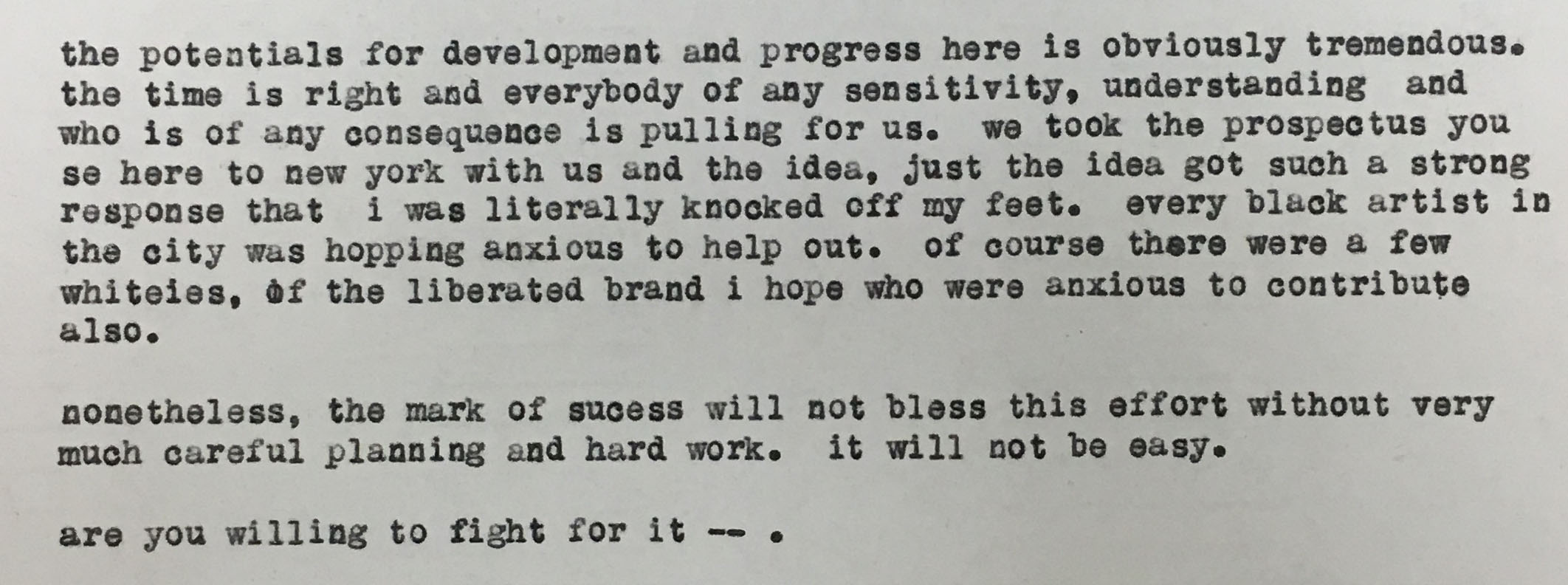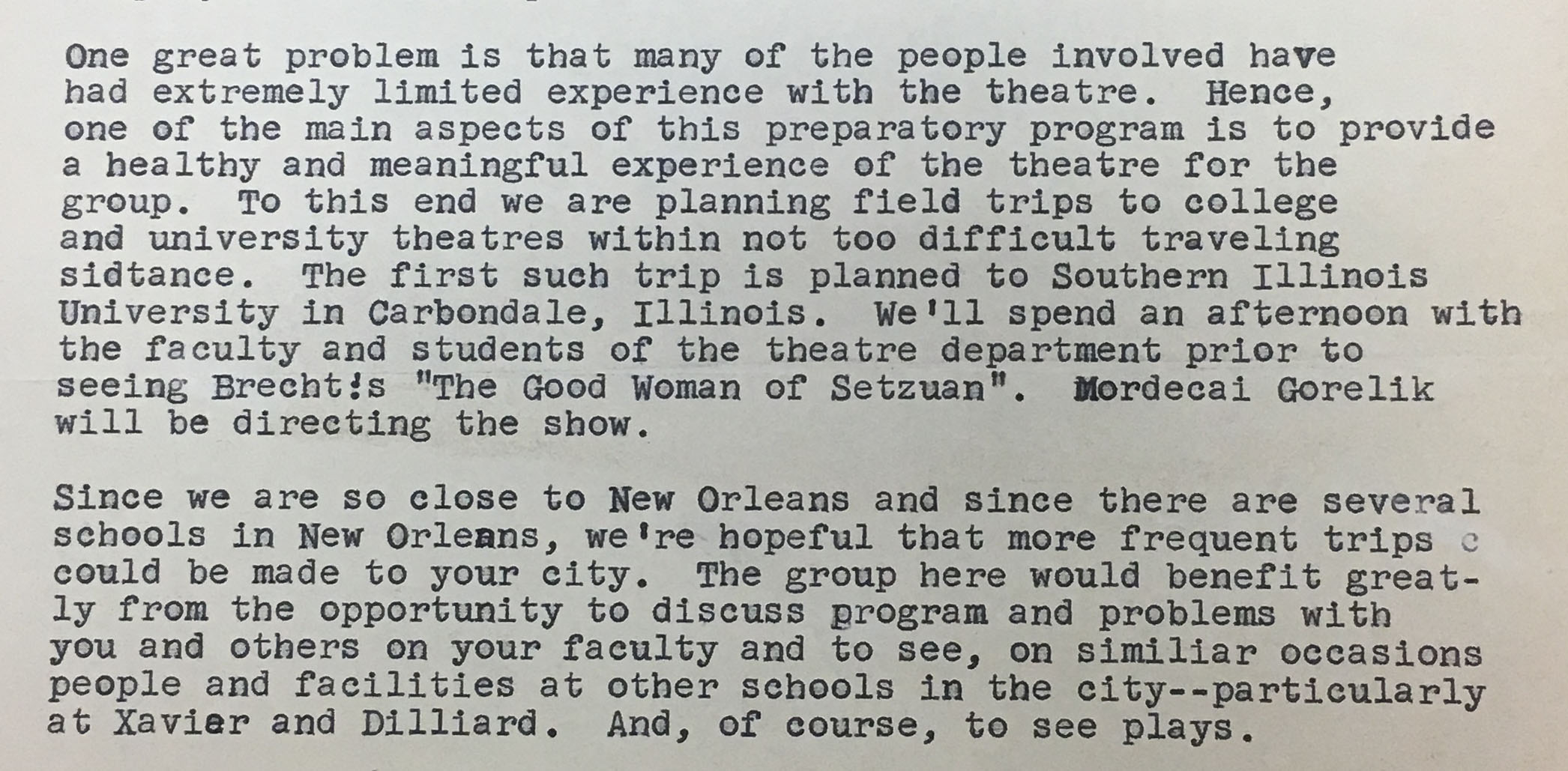The Establishment of a Free Southern Theater
Building Capacity: Networks and Training
After the creation of their founding documents, the team hit the ground running. In a January 1963 letter to John 7x, O’Neal details that the team had divided up the work with Gilbert Moses “handling most of the dramatic stuff” and Doris Derby and himself “concentrat[ing] on public relations.” One can see over a series of letters spanning the week of January 11 to January 17, 1964 a window into the flurry of activity John O’Neal was activating in an effort to make connections and secure opportunities to deepen the exposure of participating Tougaloo College students in the art of the theater. These letters are available at the Amistad Research Center at Tulane University in New Orleans, Louisiana in the John O’Neal Papers. Very much in the vein of his community organizing background, John O’Neal knew that the success of the Free Southern Theater would be bolstered by forming a variety of connections not just to himself and the organization, but to the Jackson students who were part of the on the ground operations.
In his letter to John 7x dated January 11, 1963, O’Neal is reaching out to a former collaborator and musician who he might tempt to join the ranks of Free Southern Theater to offer his musical expertise. We read here that he has already been hard at work securing connections for future fundraising with a recent trip to New York where he felt Free Southern Theater had received a positive reception.

Excerpt from a single page letter to John 7x in Atlanta, Georgia written by John O’Neal sharing informational materials about the Free Southern Theater and an invitation to join them as a musician.
This same day we read in a letter to Prof. Mordecai Gorelick of the Southern Illinois University Theater Department that O’Neal is working to coordinate learning trips for Tougaloo and Jackson College students who are involved in the burgeoning Free Southern Theater activities. O’Neal had been referred to Mr. Gorelick via his old theater professor Dr. Christian Moe. John is not only trying to secure an opportunity for his group to see their presentation of Bertolt Brecht’s “The Good Woman of Szechwan,” but to engage in dialog on the technical and conceptual considerations of the production.

Excerpt from a letter to Professor Mordecai Gorelick from John O’Neal requesting to bring a contingent of students and theater compatriots from Jackson to see his current production and engage in a dialog afterward.
Five days later on January 16, 1964, John sends a letter to Prof. William Scheckner of the Tulane University Drama Department with the intent to form similar connections for learning exchanges. John is not only expanding the network of the Free Southern Theater and creating opportunities for exposure to local Jackson students with rare occasion to experience these types of cultural performances, but John also once again shares the Prospectus and invites critique on these foundational documents. In the excerpt below, John expands a bit on the intentions behind these learning exchanges.

Excerpt from a letter to Prof. William Scheckner from John O’Neal requesting to bring a contingent of students and theater compatriots from Jackson for a learning exchange with his students.
Looking to make the most of any trips Free Southern Theater will make with their students, on January 17, 1964 John O’Neal writes a response to a recently received letter from a person simply addressed as Ted in the salutation. Ted is apparently in connection with a number of schools in the area around Southern Illinois University where O’Neal will be taking students to see the Brecht performance. John takes the opportunity to share the Free Southern Theater Prospectus, update him on the “Theater Workshop” in which his students are participating at Tougaloo College, and request connections he might make while he is in the area.

Excerpt from a letter to Ted from John O’Neal requesting connections to Drama Departments in the area near Southern Illinois University where he might take his students while they are visiting.
One can easily see the organizer in John in this small January window into his efforts to network and set up opportunities for the growing troupe of the Free Southern Theater. Following the creation of the Proposal and Prospectus, the Free Southern Theater team wasted no time in beginning their fundraising, network building, and training to catalyze their new endeavor.
daniel@significantdevelopments.us — Jackson, Mississippi